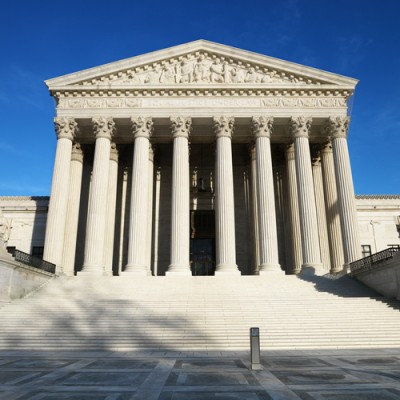SCOTUS limits venue in patent suits, making it more difficult to file in friendly jurisdictions

The U.S. Supreme Court on Monday narrowed the locations where patent infringement suits can be filed in a unanimous decision interpreting conflicting statutes on venue.
The court ruled (PDF) that a law authorizing patent suits to be filed in the judicial district where the defendant “resides” was not supplanted by amendments to a general federal law on venue. The more lenient general law gives “resides” a broad meaning, allowing federal suits to be filed wherever a corporation is subject to personal jurisdiction.
The narrow definition of “resides” requires patent suits filed under that prong of the venue statute to be filed in the state where the company is incorporated, according to the opinion by Justice Clarence Thomas.
The decision will make it more difficult to file infringement suits in friendly jurisdictions.
Intellectual property partner John O’Quinn of Kirkland & Ellis called the decision “seismic” in a statement emailed to the ABA Journal, and said it could lead to more infringement being filed in Delaware, where many corporations choose to incorporate. The decision will “otherwise funnel cases towards defendants’ home jurisdictions,” O’Quinn said.
Q. Todd Dickinson, a Polsinelli IP partner, said in an emailed statement that the decision “blows the ‘Eastern District of Texas’ problem out of the water.” The Eastern District of Texas is considered a plaintiff-friendly jurisdiction.
The patent law states that patent infringement suits may be filed in the judicial district where the defendant resides, or where the defendant has committed acts of infringement and has a regular and established place of business. Because the patent law is not modified by the general venue law, “resides” has a narrow meaning—the state of incorporation—which was established in a 1957 Supreme Court case, Thomas said.
The Supreme Court ruled in a suit by Kraft Foods Group, which sued drink maker TC Heartland for infringement in Delaware federal court. TC Heartland is incorporated and headquartered in Indiana, and it sought to transfer the case to federal court in the Southern District of Indiana. The Federal Circuit had ruled venue was governed by amendments to the general law on venue, and the case could be brought in Delaware. The Supreme Court reversed.
Though the general patent law states that it applies “for all venue purposes,” it does not clearly indicate it was intended to modify the venue restriction in the patent law, Thomas said. “When Congress intends to effect a change of that kind, it ordinarily provides a relatively clear indication of its intent in the text of the amended provision,” he wrote.
The case is TC Heartland v. Kraft Food Brands Group. Justice Neil M. Gorsuch didn’t participate in the case.



